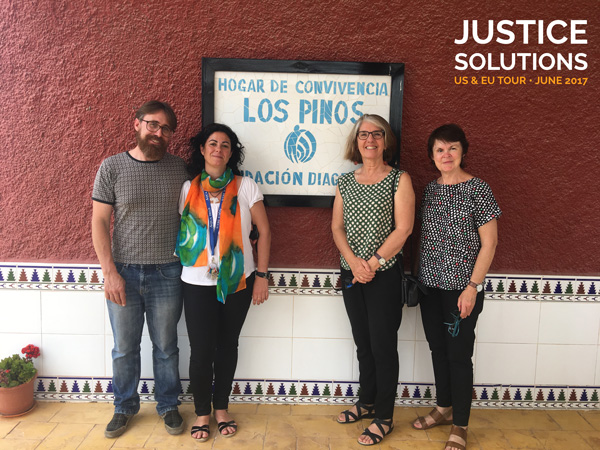As part of our ongoing blog series highlighting the learnings of our Justice Solutions tour, Jesuit Social Services’ Executive Director of Programs SALLY PARNELL writes about Spain’s “re-education” centres that have love and boundaries at their heart.

David (left) and Anna from Diagrama with Jesuit Social Services’ Julie Edwards and Sally Parnell (right).
What we hear over and over again, and indeed witness over and over again is what’s at the heart of Diagrama’s model – Love and Boundaries. They seem to walk the talk consistently on this at all levels.
The Diagrama Foundation is a growing international non-Government organisation, including being the largest provider of Youth Educational Centres in Spain – akin to youth detention facilities in the Australian context.
Diagrama runs 38 separate centres across Spain, all with often a gender mix and often offering closed, semi-open and open sections all contained in the one facility. Julie Edwards and I had the opportunity to visit six of these facilities over a two day visit, accompanied by David McGuire, Executive Officer for Diagrama UK. David has a long history of working in Spanish Centres in various roles.
The six centres we visited are close to Alicante (population approx. one million) and Murcia (population approx. 400,000) in southern Spain. What is striking with each of these centres, the oldest one now in operation for 25 years, is the consistency of the model of practice as well as the stability and experience of staff teams. The large majority of staff we interacted with have been connected to Diagrama for more than eight years.
These centres are prison-like in many respects; simple structures, safety and security integral to the model, with consistent internal design features and often built in rural surrounds. The principle of being close to home is obvious, with family encouraged to visit at any time.
David describes the optimal centre being between 60-80 beds. Young people are in separate units with no more than 12 in each. Each unit has a system of rewards and privileges, which encourages young people to progress through a five-staged model from induction through to a stage of autonomy. The objective of day, weekend and longer periods of release is part of the re-socialisation process.
Girls and boys are placed in the same unit, children are supervised at all times and staff share meals with young people. We witnessed very respectful and warm interactions between young people and between young people and staff. Whilst it’s part of the Spanish cultural tradition to be demonstrative and affectionate, it is a deliberate aspect of the Diagrama approach and evident in our observation that children and staff seem comfortable with each other. The interaction is respectfully intimate, and boundaries between ‘social educators’ (responsible for day to day care) and children are natural and genuine – there is lots of laughter, however respect for the staff’s authority is palpable, but relaxed.
David reported the common staff ratio to be two social educators (university educated) to 12 children. One security person is present in the unit at all times…their presence is subtle, but they are a central part of the unit team.
Each Educational Centre also has what is termed a Technical team – made up of teachers, psychologists and social workers who are responsible for the development and delivery of individualized plans for each child. These plans are tailored to a young person’s offending behavior – e.g. anger management; family mediation; deradicalisation; family violence – the interventions are a mix of 1:1 counselling, follow-up after an emotional outburst (seen as normal teenage behavior) and group work.
Children participate in five hours of school or vocational education each day, however Diagrama’s definition of education embraces skills for life, including developing respectful interacting with others, responsibility for own behaviour, resolving conflict as well as the practical skills of caring for their rooms, personal hygiene, house chores etc.
Staff couldn’t recall any young people on staff violence and only maybe three incidents per year related to young people on young people violence in the whole of the Educational Centre!
One of the facilities we visited, an open unit, housed young people sentenced by the court for violence in the family home – usually toward their parents. During the day children attend school in the community, but must reside at the facility at night and weekends and participate in individually tailored mediation sessions, firstly alone with the psychologist and gradually with the victim of the offence – very often their mother. Both parents are encouraged to participate. Staff are very attuned to the often suboptimal home circumstance of each child and why violence may have escalated.
David told us that Diagrama has recently taken over the operations of several children’s homes in the UK previously run by other providers. Though staff ratios are high, relationships tend to be tense and very disrespectful between children and between staff and children. David has a goal of turning this around through applying the Diagrama ethos and model – employing experienced staff, implementing an education-focused approach and ensuring love and boundaries drive the practice. His belief is that the staff are the key. These lessons need to be at the centre of reform to Victoria’s out of home care and youth justice systems.


